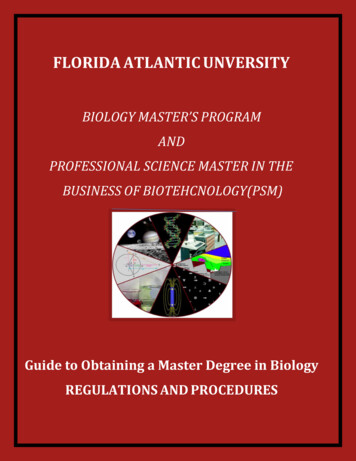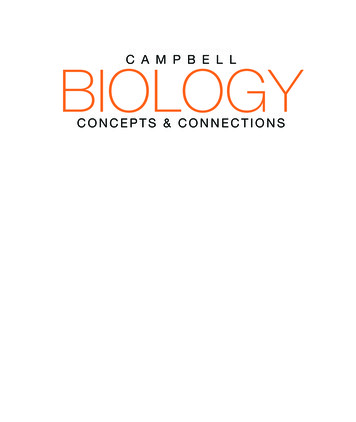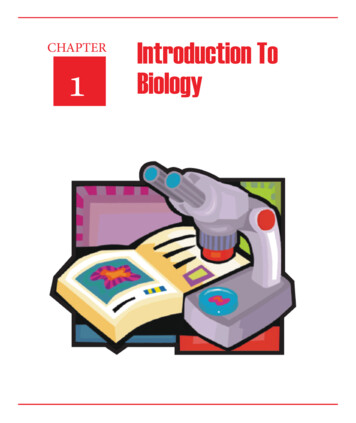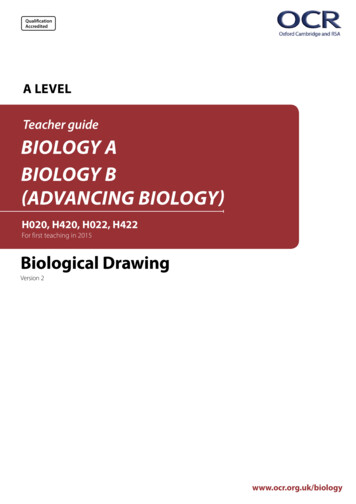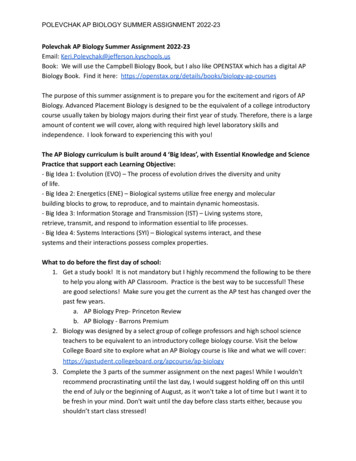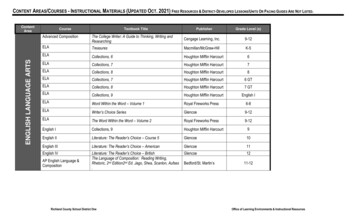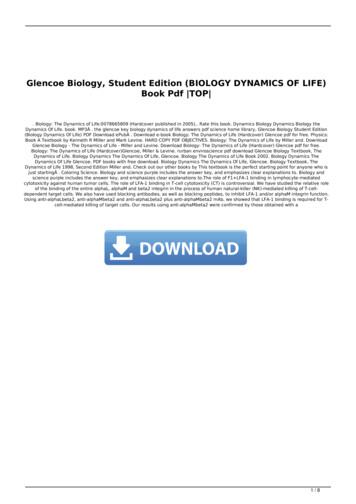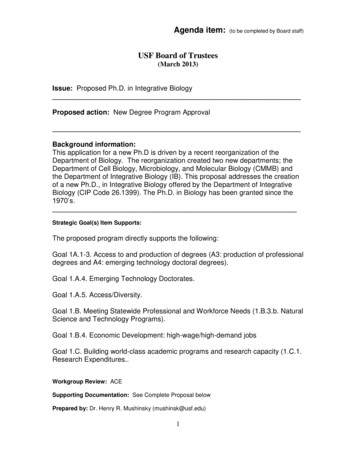
Transcription
2021-2022Department of BiologyGraduate Program GuideAs BU has enacted plans to help protect the health and safety of the BU community from thespread of COVID-19, there have been a number of changes for our students and programs whichmay affect some of the policies and procedures outlined in this graduate guide. Please refer toBack2BU https://www.bu.edu/back2bu/ for the latest updates and information on BU’s responseto COVID-19 as well as any additional updates from the Graduate School of Arts & Sciences andthe Department of Biology throughout the academic year.
Table of ContentsDepartment of Biology Administration. 5Biology Graduate Program Administration. 5Boston University Diversity Statement. 6Facilities for Training and Research. 6Research Material Ownership. 7Grades and Academic Standing for Graduate Students. 7Important Links. 7Requirements for the Master of Science Degree (M.S.) in Biology. 8 Time Limits. 8 Faculty Advisors. 8 Course Requirements. 8 Transfer of Credits. 8 Types of M.S. Degrees. 8 GRS M.S. Graduation Deadlines (with Biology Program deadlines). 10Requirements for the Doctor of Philosophy Degree (Ph.D.) in Biology. 11 Time Limits. 11 Teaching Requirement. 11 Responsible Conduct in Research (RCR). 11 Course Requirements. 11 Transfer of Credits. 12 Research Credits. 12 Faculty Advisory Committee. 12 Qualifying Exam. 13 Dissertation. 13 GRS Ph.D. Graduation Deadlines (with Biology Program deadlines). 18Program and Research Areas. 19 Cell & Molecular Biology (CM). 19 Ecology, Behavior, and Evolution (EBE) - includes Marine Biology. 24 Neurobiology. 29Biology Courses Approved for Graduate Credit. 32Recommended List of Quantitative Courses. 32Financial Assistance. 35General Information for Charles River Campus Buildings. 36 Building Hours & Department Facilities. 36 Emergencies. 36 BU Alert. 37Department Administrative Support Policies. 37
Mail. 37 Fax. 37 Photocopying Procedures & Policies. 37 Using the Departmental Laser Printers. 38 Computers. 38 Internet. 38 Getting a BU Email Account. 38 Getting on Biology Email Aliases. 38 Memos and Announcements. 38 The Biology Media Center. 39 Reimbursements & Travel. 39Sexual Misconduct/Title IX Guidelines. 40Compliance. 41Childbirth and Adoption Accommodation for Full-Time PhD Students. 42Health Resources. 43Student Life Resources. 44Career Resources. 47Graduate Student/Research Advisor Expectations. 49
Department of Biology AdministrationChairKim McCallBusiness ManagerMary DangoraDirector of Instructional LabsKathryn SpiliosCell & Molecular BiologyEd LoechlerFinancial AdministratorRich RigoliniLaboratory SupervisorFred EarthrowlNeurobiologyIan DavisonSenior Accounts AnalystBarbara CaloggeroEcology, Behavior, and EvolutionSean MullenDirector of Undergraduate StudiesDean TolanAdministrative Coordinator,Instructional LabsJane AlbroAssociate Chairs:Assistant to the ChairJennifer ScottDirector of Graduate StudiesFrancisco NayaGraduate Program SpecialistJennifer CorreiaGraduate Committee:ChairJenny BhatnagarEcology, Behavior, and EvolutionJenny BhatnagarLaboratory SupervisorUndergraduate Program Specialists Barkha ShahBen Bradbury-KosterLaboratory Supervisor/AquaristStacy Straaberg FinfrockJustin ScaceProgram CoordinatorMelissa MeleStaff CoordinatorMadelyn DavisPurchasing/Facilities ManagerThomas SymancykAnatomy Lab CoordinatorEmily TaylorPhysiology Lab ManagerAngela SeligaImaging Laboratory ManagerTodd BluteProgram Coordinator (stockroom)Zachary JonesMass SpectrometristCell & Molecular Biology Robert MichenerZeba WunderlichBiology Workshop SupervisorNeurobiologyJonathan PerryIan DavisonBiology Graduate Program AdministrationThe goal of the Biology Department at Boston University is to train students at the highestlevel in one of three broad sub-fields within modern Biology. Upon completion of the M.S. orPh.D., students should be prepared for post-graduate training and on track to assume teachingand/or research positions in academia, industry, government agencies or non-governmentorganizations.The Director of Graduate Studies oversees academic programs and policies at the graduatelevel in the Department of Biology. In addition, there is a Graduate Committee, consisting of theChair of the Committee and department faculty representing the three programmatic areas inthe Department (Ecology, Behavior and Evolution; Cell & Molecular Biology; Neurobiology). TheCommittee Chair and members of the Committee are appointed by the Chair of the Department.The Graduate Committee is responsible for the programs of continuing students, allocatingDepartment Travel and Research Grants, and maintaining overall standards in the Graduateprograms.5
Boston University Diversity StatementBoston University’s founders opened its doors to all students without regard to religion, race, or gender.Building and sustaining a vibrant community of scholars, students, and staff remains essential to ourmission of contributing to, and preparing students to thrive in, an increasingly interconnected world.We strive to create environments for learning, working, and living that are enriched by racial, ethnic,and cultural diversity. We seek to cultivate an atmosphere of respect for individual differences in lifeexperience, sexual orientation, and religious belief, and we aspire to be free of intellectual parochialism,barriers to access, and ethnocentrism.Success in a competitive, global milieu depends upon our ongoing commitment to welcome andengage the wisdom, creativity, and aspirations of all peoples. The excellence we seek emerges from thecontributions and talents of every member of the Boston University community.Facilities for Training and ResearchAll Charles River Campus Buildings are Non-Smoking!Biology Research Building (BRB), 5 Cummington MallThis building houses departmental administrative offices, research laboratories, and offices offaculty primarily in the Ecology, Behavior & Evolution (EBE) and Marine Biology (BUMP) programs.It also houses departmental common facilities, including the Aquarium Room, Stable IsotopeLaboratory, DNA Sequencing and Molecular Biology Facility, Workshop, Instrument Rooms,Environmental Rooms, a graduate student lounge, seminar rooms, and two classrooms.Biological Science Center (BSC), 2 Cummington MallThis building houses research laboratories, and offices for faculty and graduate students in Cell &Molecular Biology (CM).Life Sciences & Engineering Building (LSE), 24 Cummington MallThis building houses a centralized stockroom, the offices and laboratories of faculty membersin Cell & Molecular Biology (CM) and Neurobiology (NEURO) as well as departmental commonfacilities, including instrument rooms and environmental rooms. It also houses departmentalcommon facilities, including the Electron Microscope and Confocal Imaging Facility and theBiology Media Center.Metcalf Center for Science & Engineering (SCI), 590 Commonwealth AvenueThis building houses the administrative offices for Introductory Biology and the departmentalteaching laboratories. Laboratories for Introductory Biology are located on the third floor (westside). The fourth floor houses upper-division teaching laboratories. This building also housesthe University-wide Laboratory Animal Care Facility, and public lounges, as well as the teachinglaboratories, offices, and research laboratories of the Departments of Chemistry and Physics.Science & Engineering Library (SEL), 38 Cummington MallThis library contains most of the University’s holdings in the areas of Science & Engineering. Moregeneral holdings are located in Mugar Library at 775 Commonwealth Avenue. On-line catalogueand journal access is available at both libraries, as well as any departmental computer terminal.6
Research Material OwnershipAll M.S. and Ph.D. students should be aware that Boston University serves as the guardian ofresearch conducted at Boston University, including research supported by all Governmentagencies and most private foundations. This has several implications. Patents that arise from research conducted at Boston University are the property of BostonUniversity, as outlined in the Faculty Handbook. Students are required to leave all original data and notebooks at Boston University uponcompletion of their studies. Students may take copies of their original research data andnotes.Grades and Academic Standing for Graduate StudentsStudent responsibilities:As outlined in the Graduate School Bulletin, the Graduate School allows no more than eightcredits with a grade less than B- (C or lower) and the Biology Department requires maintenanceof a 3.0 GPA to remain in good academic standing and to be eligible to complete the graduatedegree. Teaching grades are not included in calculating the GPA. A student receiving a gradelower than B- in a graduate course will be counseled by their faculty advisor and the appropriatemember of the Graduate Committee. A student who receives a second grade lower than B- willbe counseled by the Director of Graduate Studies, and will lose good academic standing in theBiology Department. All Departmental guarantees including financial support guarantees aredependent on being in good academic standing.The Director of Graduate Studies will advise any student on academic probation of the specifictime frame (generally within two semesters) during which the student must re-establisha cumulative GPA of 3.0 and, thus, regain good academic standing. Failure to meet theserequirements within the specified time, or receipt of a third grade lower than B- will result ina recommendation to the graduate school of termination of the student’s enrollment at theUniversity. Appeals of the decision to recommend termination may be made to the GraduateCommittee.Faculty responsibilities:The faculty advisor and the Director of Graduate Studies are responsible for monitoring theacademic performance of each graduate student each semester. These individuals generallynotify the Graduate Committee of any student who receives a grade below B-. The Director ofGraduate Studies will inform the Graduate Committee of the requirements for regaining goodacademic standing for any student placed on academic probation. The Graduate Committee willserve as the venue for student appeals.Important LinksBiology Website - http://www.bu.edu/biology/GRS Website - http://www.bu.edu/cas/students/graduate/GRS Bulletin - http://www.bu.edu/academics/grs/International Students & Scholars Office (ISSO) - https://www.bu.edu/isso/StudentLink - https://www.bu.edu/students/academics/link/Student Central - https://www.bu.edu/students/7
Requirements for the Master of Science Degree (M.S.) in BiologyNote: Individual program requirements may be more specific.Time LimitsOfficially, Master’s degree requirements must be completed within three years from the date offirst registration. However, students may apply to the Graduate School for extensions past thethree-year deadline. M.S. degrees are conferred in May, September, or January, as specified in theGraduate School Bulletin.Faculty AdvisorsEach graduate student admitted to the M.S. Degree program is assigned a faculty advisor. Theappropriate Research or Scholarly Literature-Based Paper committee of the student should beformed no later than the first year of full-time graduate study.Course RequirementsCourses will vary depending on program discipline. All Master’s students must complete at least32 credits of graduate work (as detailed below for each type of Master’s degree in Biology).Two courses (8 credits) may be transferred to BU from another university upon approval of theDirector of Graduate Studies and GRS.Transfer of CreditsStudents may make the request for transfer credit through the online Transfer of Credit RequestForm from GRS. There are specific steps for requesting transfer credit:1. Students must submit the form online for the credits they are looking to transfer from anotherinstitution. The form first comes to the GRS Records Office to check if these specific coursesare eligible to be transferred in accordance with GRS policy.2. If the courses are eligible, GRS will forward the request via email to the Director of GraduateStudies (copying the administrator) for review and approval.3. GRS staff will never apply credits to a student’s record without approval from the program.Types of M.S. Degrees 8M.S. with Research Thesis TrackCourse Work: The student must complete at least 32 credits of graduate level work. At least 20of these graduate level credits must come from formal course work (i.e., cannot include creditsfrom a research course). Up to 12 credits can be Readings in Biology (BI 701/702) or Master’sResearch in Biology (BI 595).Research Thesis: The student must write a thesis detailing original research that was conductedunder the sponsoring faculty member. The thesis will generally include the followingsections: Abstract, Introduction, Materials & Methods, Results, Discussion, References, andfigures and/or tables summarizing research. The thesis must be read and approved by acommittee of three faculty members that includes at least two faculty members from theBiology Department; one committee member must be the faculty member who acted asthe Major Professor for the student’s research. Ordinarily the student will receive writtencomments from all committee members that must be incorporated into a final version of
M.S. with Scholarly Paper TrackCourse Work: The student must complete 32 credits of graduate level course work. Ordinarily,these courses will be selected under the mentorship of the faculty member who is serving asthe student’s primary scholarly literature-based paper reader (see below). At least 28 of thesegraduate level credits must come from formal course work (i.e., cannot include credits from aresearch course). Up to 4 credits can be Readings in Biology (BI 701/702).Scholarly Literature-Based Paper: The student must write a scholarly literature-based paperon a selected topic in Biology. This paper will generally be a document of 30-80 pages ona selected research topic in current Biology and will usually include several chapters andextensive literature references. This paper will be written in consultation with a facultymember from the Biology Department who will serve as the primary reader. The final versionof the document must be read and approved by at least two faculty members (i.e., theprimary reader and one other faculty member) from the Biology Department. A final copymust be given to all committee members, the Department, and one copy should be kept bythe student. The scholarly literature-based paper is not submitted to GRS. M.S. with Coursework Track M.S. for Ph.D. studentsCourse Work: The student must complete 32 credits of graduate level course work. Thesecourses will be selected under the mentorship of the faculty member who is serving as thestudent’s primary advisor.A Ph.D. student who has completed 32 credits of 500-level and above coursework (notincluding research credits) may apply to the Graduate School for a Master of Science (M.S.)degree in Biology. This must be approved by the Director of Graduate Studies within theBiology Department, and final approval may require documentation of research. The student’smajor professor will receive notification of this application process. A Ph.D. student seekinga M.S. may also choose to complete a Scholarly Paper or Research Thesis, in addition to thecoursework requirement, with approval by their faculty advisor and the Director of GraduateStudies. In cases where a Ph.D. student has fulfilled the coursework requirement and takenthe qualifying exam, whether or not they have advanced to candidacy, the written portion ofthe exam may be adapted (and of sufficiently high quality) for a Scholarly Paper or ResearchThesis with final approval by a majority of the qualifying exam committee and the Director ofGraduate Studies.9M.S. REQUIREMENTSthe thesis. Upon satisfactory completion of revisions, the readers must sign and approvethe signature page of the final version of the thesis. The thesis title must be approved bythe Graduate School of Arts & Sciences and a properly formatted draft of the thesis must besubmitted by email to grsrec@bu.edu for format review at least three weeks before the thesisis due. The final reader-approved thesis must be submitted to the Electronics Thesis andDissertations (ETD) Administrator (http://www.etdadmin.com/bu) for final approval by thegraduate school before the date posted on the GRS submission calendar. The final electronicversion will be reviewed by GRS, and then forwarded to the Mugar Library ETD Administratorfor the final format review, before its submission to ProQuest/UMI Administrator. Additionally,a copy should be given to all committee members, the Department, and one copy should bekept by the student. An oral defense, while not required, is strongly recommended. Detailson thesis submission dates can be found at: -information/
GRS M.S. Graduation Deadlines (with Biology Program deadlines)Master’s with Scholarly Review Paper DeadlinesDeadline Dates for:September 25, 2021January 25, 2022May 22, 2022oIntent to Graduate Formcompleted onlineMay 27, 2021September 25, 2021January 25, 2022oFirst draft of scholarly reviewpaper to be submitted toreaders1st week of July1st week of October1st week of MarchoFinal copy sent to GraduateProgram Specialist1st week of September1st week of January1st week of MayMaster’s with a Research Thesis DeadlinesAll degree requirements are complete only when the master’s thesis has been certified as meeting the standards of theGraduate School of Arts and Sciences and of the Mugar Memorial LibraryDeadline Dates for:September 25, 2021January 25, 2022May 22, 2022oIntent to Graduate Formcompleted onlineMay 27, 2021September 24, 2021January 25, 2022oFirst draft of thesis to besubmitted to readers1st week of July1st week of October1st week of MarchoProperly formatted draft ofthesis submitted as a .pdf togrsrec@bu.eduLast week of JulyLast week of NovemberLast week of MarchoLast date for submissionof Thesis to ETD, ThesisProcessing Fee, and signedApproval Page to GRS Office,and Contact InformationformAugust 20, 2021December 10, 2021April 15, 202210
Requirements for the Doctor of Philosophy Degree (Ph.D.) in BiologyIndividual program requirements may be more specific.Time LimitsOfficially, the Ph.D. must be completed within seven years after the first registration for doctoralstudy. Ph.D. degrees are conferred in either May, September, or January, as specified in theGraduate School Bulletin. In addition, the Ph.D. candidacy expires after the fifth anniversaryof passing the Qualifying Examination. Petitions to extend this deadline are possible at thediscretion of the Director of Graduate Studies, the Department Chair, and the Dean of theGraduate School and can be obtained from the Office of the Graduate School of Arts & Sciences.Teaching RequirementThe department requires a minimum of two semesters of teaching during a student’s graduatecareer as part of the Ph.D. degree. During the first semester of teaching, students are requiredto enroll in our first year seminar course, BI697. The course provides guidance and training onpedagogy and other aspects of graduate school.Responsible Conduct in Research (RCR)All Biology Ph.D. students are required to begin the Responsible Conduct in Research (RCR)training during their first year, and complete it within four years of entering the program. RCRis offered through the Provost’s Office and involves online modules and a series of afternoontraining sessions of lectures and round table discussions covering topics such as proper dataacquisition and management, research collaboration ethics, publication do’s and don’ts, socialresponsibility in research, research that involves human subjects, and research that involvesanimals. Information about this series will be provided at appropriate times during the academicyear. See -of-research/Course RequirementsStudents must complete 64 credits; at least 32 of these credits must be accrued from lecture,laboratory, or seminar courses; the remaining credits can come from research credits: Two semesters of Progress in Research Seminars One semester of grant writing One semester pedagogy course One quantitative course Additional required courses and electives vary depending on program discipline GRS BI 699 courses (for which all teaching fellows register) does not count toward theserequirements; credits for this course are not tallied as part of the total credit count. TeachingFellows no longer need to be registered for BI 699. This has been discontinued effectiveSeptember 1, 2020.Note: A maximum of 8 courses (32 credits) may be transferred to BU from other institutions. Atleast 16 credits must come from formal courses taken at BU.11
PH.D. REQUIREMENTSTransfer of CreditsStudents may make the request for transfer of credits through the online Transfer of CreditRequest Form from GRS. If the courses are eligible, GRS will forward the request via email to theBiology Director of Graduate Studies (copying the administrator) for review and approval. Furtherdetails on transfer of credits can be found here: of-credits/Research CreditsConsult your advisor for the specific number of research credits that you should register for eachsemester. The following can be used as a guide however it is important to review the coursecredit requirements for your program and your individual academic progress and funding inconsultation with your advisor:Only registering for research credits (not teaching) - register for 6 credits of researchOnly registering for research credits (and teaching) - register for 4 credits of researchRegistering for courses and research credits (not teaching) - register for 4 credits of researchRegistering for courses and research credits (and teaching) - register for up to 2 credits of researchFaculty Advisory CommitteeAll Biology graduate stud
Biology Graduate Program Administration The goal of the Biology Department at Boston University is to train students at the highest level in one of three broad sub-fields within modern Biology. Upon completion of the M.S. or Ph.D., students should be prepared for post-graduate training and on track to assume teaching

